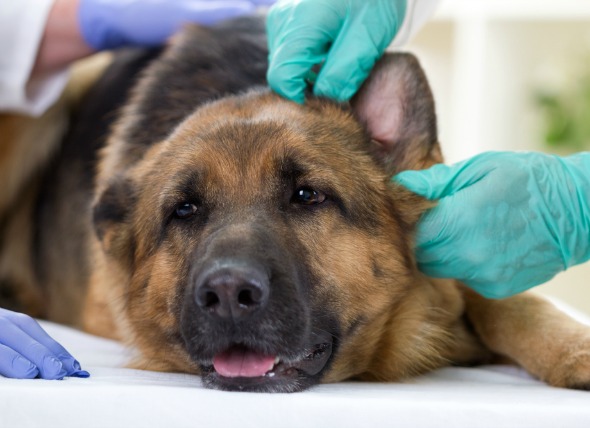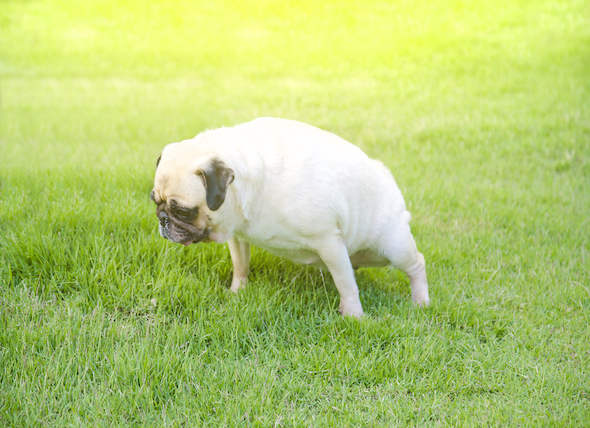

Chronic gastritis is the term used for intermittent vomiting of greater than one to two weeks caused by inflammation of the stomach. The stomach lining can be irritated by chemical irritants, drugs, foreign bodies, infectious agents, or long-term hyperacidity syndromes. Long-term allergen exposure, or immune-mediated disease (where the body's own anti-bodies attack the tissues of the body) may also produce long-term inflammation of the stomach’s lining.
Old, small-breed dogs like Lhasa Apsos, Shih-tzus, and Miniature Poodles are more commonly affected with long-term gastritis. But larger breeds such as the Basenjis and the Drentse Patrijshond can also develop long-term gastritis.
The frequency of vomiting may also increase as the stomach inflammation progresses. This can occur early in the morning or be induced by eating or drinking.
Chronic gastritis is ultimately caused by inflammation of the stomach. Underlying factors that may induce this include:
Your veterinarian will perform a thorough physical exam and order blood work: a chemical blood profile, complete blood count, and urinalysis. The blood work will tell your veterinarian how dehydrated your pet is, how much blood your pet has lost, if the disease is long-term, if the disease is caused by a faulty immune system or liver disease, if your pet has ulcers, or if your pet has some other disease of the organs causing the stomach inflammation.
Abdominal X-rays, contrast X-rays, and an abdominal ultrasound will help to determine the underlying cause of the stomach’s inflammation. A biopsy of the stomach is essential for diagnosis. A fecal floatation should also be done to check for intestinal parasites. Surgery may be required in some cases, and an endoscopy can be performed to remove foreign objects and to take samples of the stomach.
Your pet probably will not have to be hospitalized unless it has been vomiting very severely and needs immediate fluid therapy. You should work with your veterinarian, letting him or her know if new diets (chosen by your veterinarian) and medications are causing your pet’s disease to improve.
If your dog becomes very dehydrated or begins vomiting severely take it to the veterinary hospital for surveillance and fluid therapy.
You should return with your dog to the veterinarian weekly for complete blood counts, and then return every four to six weeks if your pet is on drugs (i.e., Azathioprine, chlorambucil), which suppress bone marrow (since blood cells are produced in the bone marrow). Diagnostic work-ups should be done with each visit, and another sample of the stomach for analysis at a laboratory should be considered if signs of stomach inflammation decrease, but do not entirely go away.
Be sure not to give any painkillers to your dog on your own, unless your veterinarian has specifically prescribed them and then only as prescribed. Avoid any foods that cause stomach irritation or allergic response in your dog. If you have any questions ask your veterinarian to help you to create a meal plan while your dog is recovering.
In addition, do not let your pet roam freely, as it may eat whatever it wants to eat and will be vulnerable to chemical and environmental toxins and parasites.
(Please note that this list is only a guideline. Consult your veterinarian as necessary and confirm these guidelines before implementing them, as all dogs are different and different diseases need different treatments):
 Low White Blood Cell Count in Dogs
Neutropenia in Dogs
The white blood cells known a
Low White Blood Cell Count in Dogs
Neutropenia in Dogs
The white blood cells known a
 Bacterial Infection (Leptospirosis) in Dogs
Leptospirosis in Dogs
Leptospirosis is an
Bacterial Infection (Leptospirosis) in Dogs
Leptospirosis in Dogs
Leptospirosis is an
 Fungal Disease (Sporotrichosis) of the Skin in Dogs
Sporotrichosis in Dogs
Sporotrichosis is a fungal
Fungal Disease (Sporotrichosis) of the Skin in Dogs
Sporotrichosis in Dogs
Sporotrichosis is a fungal
 Stomach Flu with Bloody Diarrhea in Dogs
Hemorrhagic Gastroenteritis (HGE) in Dogs
Hemorrh
Stomach Flu with Bloody Diarrhea in Dogs
Hemorrhagic Gastroenteritis (HGE) in Dogs
Hemorrh
 Acute (Sudden) Dog Diarrhea
Dog Diarrhea has four general reasons for occurring: osm
Acute (Sudden) Dog Diarrhea
Dog Diarrhea has four general reasons for occurring: osm
Copyright © 2005-2016 Pet Information All Rights Reserved
Contact us: www162date@outlook.com